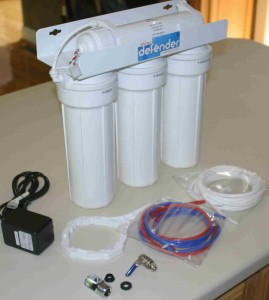I am often asked which water filter is the best. It is a straightforward question but the answer can be complex. In order to know which water filter will provide you with healthy water you must first learn what is in your water so that you know what contaminants you must remove. Only then can you determine which water filter is the best for you.
My view is that healthy water comes from rivers, springs, and lakes which has been treated in the home to remove the chemicals added by cities. Ideally this water would contain low levels of naturally occurring minerals.
Unfortunately we have contaminated our rivers and streams with a wide variety of pollutants, including pesticides and, in some cases, a wide variety of unregulated contaminants. There has been a great deal of press in recent years on unregulated contaminants, including hormones in drinking water. You should not assume that these are present without confirming the fact. If there are cities on the river or lake upstream of where you live then the sewage plants from these cities will be discharging these contaminants in your water supply. You can figure this out by looking at a map. If no cities are present then this is not an issue with your water.
If you don’t know what your water source is you can find out by looking at your city (or other water provider’s) water report. It will identify the source of your water. For help in finding your water report, visit
Municipal Water Report or Consumer Confidence Report
Next you want to review the contaminants listed in the report. This can be confusing for many people but it is an excellent exercise. It may help if you listen to me interpret a client’s water report at the page listed above. If the only contaminants present are chlorine byproducts then a simple carbon filter will do. This is rarely the case. If you have chlorine or chloramine, the chlorine byproducts, and fluoride then you need a more complex water filter like my Kitchen Defender.
If there are cities upstream of where you live then you need a reverse osmosis system to remove the unregulated contaminants. Reverse osmosis is often criticized for also removing the healthy minerals in water but if it comes down to minerals plus hormones and other drugs the decision is an easy one. Very low levels of the unregulated contaminants can cause serious health issues.
If your water source is groundwater be sure to look into the issue of total dissolved solids (tds). These are the minerals in your water but they can also be too high. As water sits in the aquifer it dissolves the minerals it comes in contact with. Water that has too high a mineral content can be a problem in terms of penetrating your body’s cells, so it may not be hydrating. I prefer to drink water with a tds between 30 and 250, although EPA allows public water to have a tds up to 500 parts per million (ppm). Other factors that would lead me to use reverse osmosis include radioactive metals or the presence of nitrates. I sell a very nice RO system which you can learn more about at Water Purification Systems.
To learn more visit my website at Sweetwater’s Home Water Purification Sytems and sign up for my Five Steps to Pure Water. These five steps will guide you through the decision making process. They include:
1) write down your goals
2) find your water report
3) look upstream – are there sewage treatment plants
4) identify the treatments you need to remove the contaminants present
5) Buy the system that provides what you need
As you can see, learning which water filter is the best for you is more complex than it may first appear. Following these simple steps can help you in making the correct purchase for your family. Be sure to visit the resource library at my website to learn more about the health dangers associated with contaminated water.
xxx






